Worried About Your Cholesterol Levels? Try Incorporating These 38 Foods Into Your Diet to Help Lower It

foods-that-lower-cholesterol-jpg
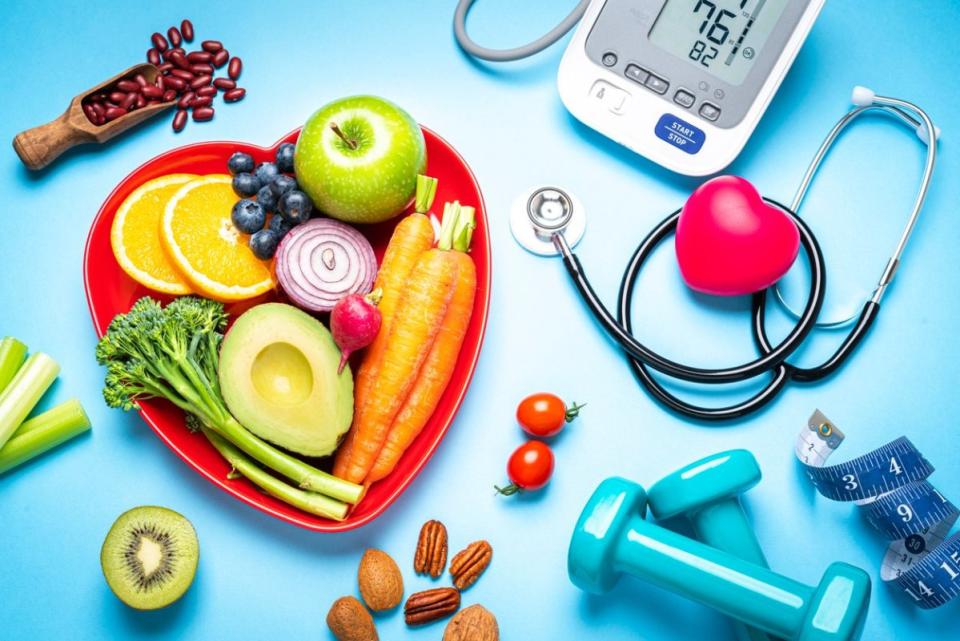
iStock
Although common, high cholesterol is dangerous and can lead to an increased risk of heart attack or stroke over time. So if you want to keep your cholesterol levels under control, we don't blame you—and your doctor is probably urging you to do the same.
If your cholesterol levels are teetering on the higher side, you may wonder what you should do to lower them—and there's no time like the present to get started. Here's everything you need to know about cholesterol and the best foods to lower it, from avocados to chickpeas and lentils.
How Does Cholesterol Work?
Cholesterol is a waxy substance that can clog arteries if there’s too much of it in the body. Your body makes cholesterol naturally, but when you eat too many foods that also contain cholesterol, these can combine to create an excess of cholesterol in your body. And that’s when things can turn bad.
There are two main types of cholesterol: HDL, or high-density lipoprotein, and LDL, or low-density lipoprotein. HDL is known as “good” cholesterol, since it works to remove LDL (“bad” cholesterol), from your arteries. So, foods that are said to help maintain healthy cholesterol can either increase HDL, lower LDL, or both.
Related: What are the Worst Foods for Cholesterol?
Which Foods Are Best to Lower Cholesterol?
There’s a long list of foods you can eat to help your cholesterol levels. While no single food may be responsible for dramatic decreases, incorporating several heart-healthy foods can definitely get your levels to more acceptable levels. Elena Paravantes, a registered dietitian nutritionist and author of the book The Mediterranean Diet for Beginners says, “foods that are rich in soluble fiber are very beneficial for cholesterol levels. Soluble fiber dissolves in water and turns into a gel-like substance. Other good choices are monounsaturated fats and foods that contain natural plant sterols such as nuts and seeds.”
Below, we’ve included a list of the best foods that lower cholesterol—and most of them are delicious!
Foods That Lower Cholesterol
Oats
“Oats can reduce blood cholesterol levels due to high levels of beta-glucan,” says Dr. Leann Poston, MD, MBA, M.Ed. a physician and contributor to Invigor Medical.
Bran
Studies show a diet rich in bran can lower high cholesterol levels.
Walnuts
Walnuts are high in folate, vitamin E, and healthy fats, says Poston. “In a study in which participants were asked to eat 392 grams of walnuts per week with no other adjustment in diet, the group that ate walnuts had improved diet quality and lower total and LDL cholesterol levels.”
Related: Can a Broken Heart Cause Actual Heart Issues?
Soybeans
Soybeans contain isoflavones that significantly reduce serum total and LDL cholesterol levels.
Salmon
Salmon is a good source of omega-3 fatty acids, which can lower cholesterol levels.
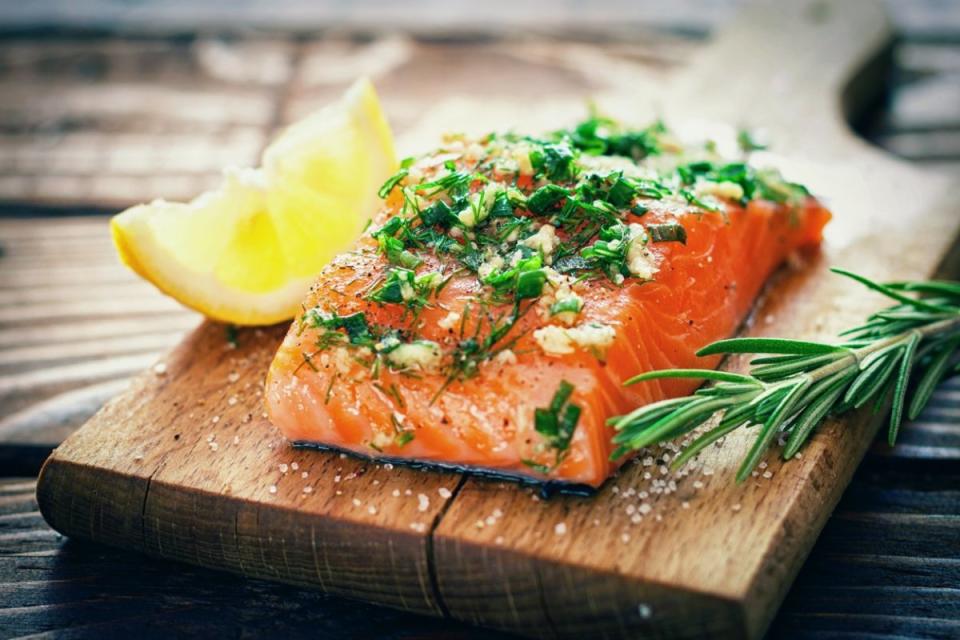
iStock
Chickpeas
Considered a legume, chickpeas are full of fiber which can help lower total cholesterol levels.
Lentils
Another high-fiber food that can help lower cholesterol, according to the Harvard Health Blog.
Related: Cleveland Clinic's Heart Health Survey Found Some Concerning Trends Around Heart Health
Avocados
Studies show that one avocado a day can reduce levels of bad cholesterol.
Mackerel
Mackerel is a fatty fish that is high in omega-3 fatty acids, Poston says.
Grapefruit
Grapefruit contains pectin, a soluble fiber that studies say can lower LDL cholesterol and is packed with antioxidants, too.
Raspberries
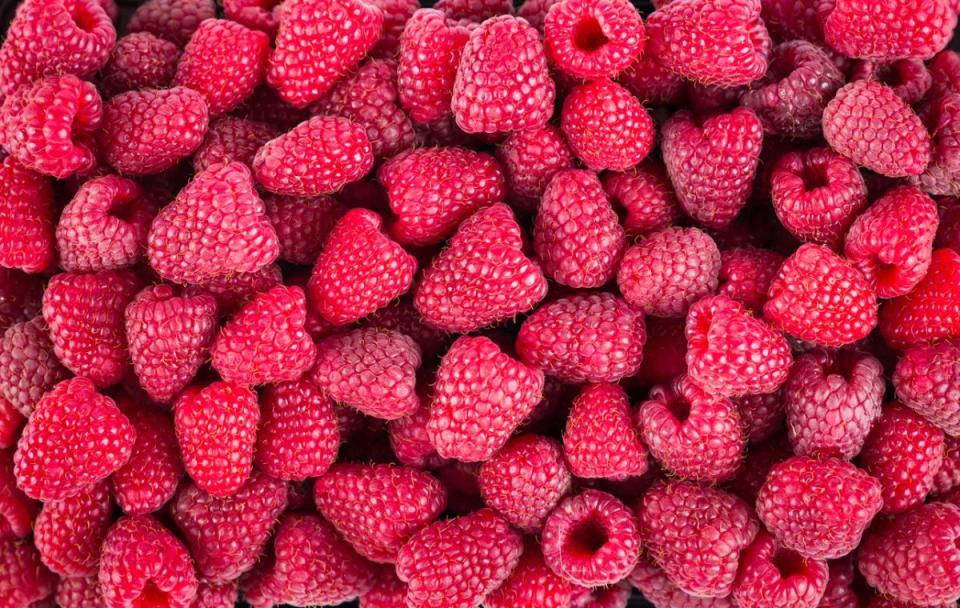
iStock
Raspberries are low in fat and high in antioxidants and flavonoids, says Poston. “In one study, raspberries significantly lowered levels of LDL cholesterol.”
Dark chocolate
Dark chocolate contains flavonoids, a compound that has been found to decrease LDL and total cholesterol.
Eggplants
high in fiber, eggplants can help lower total cholesterol.
Carrots
Carrots can help lower cholesterol by reducing the absorption of cholesterol from the gut and also seem to lower triglycerides—a bonus, says Keith Ayoob, EdD, RD, FAND, Associate Clinical Professor Emeritus, Department of Pediatrics at Albert Einstein College of Medicine in New York City.
Flaxseed
Amanda Izquierdo, MPH, RD, LDN, a registered dietitian, says, “Some research suggests that the soluble fiber and alpha-linolenic acid (an omega-3 fatty acid) in flaxseed help to lower cholesterol.”
Kale
Ayoob says, “Kale binds those bile acids and prevents them from being reabsorbed, which helps lower your blood level of cholesterol.”
Spinach
Spinach works the same way as kale to lower cholesterol.
Whole grain bread
According to Izquierdo, “Whole grain bread has more fiber than refined bread, which can help lower cholesterol.”
Extra virgin olive oil
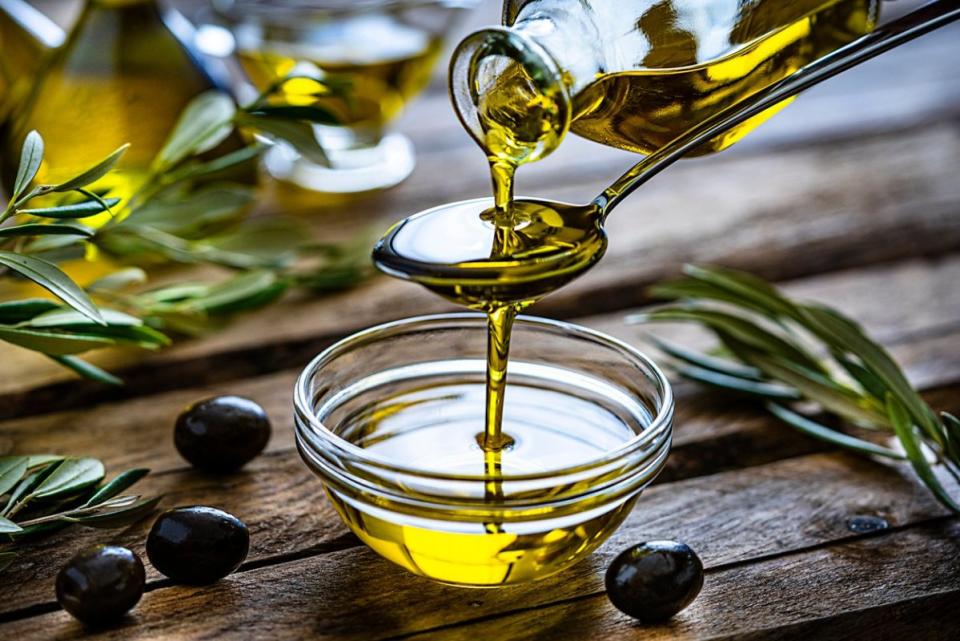
iStock
EVOO is a healthier oil than lard, butter or coconut oil, says Ayoob.
Related: What Are the Best and Worst Cooking Oils for Heart Health?
Apples
According to Poston, “Apples are high in polyphenols, fiber, and polysterols all of which can help lower cholesterol.”
Almonds
One of the healthiest foods you can eat, almonds are low in saturated fatty acids and rich in unsaturated fatty acids.
Kidney beans
“Many types of beans are chock full of soluble fiber,” says Ayoob. “About 1/2 cup 3 times a week has been shown to reduce cholesterol by 6%-8%.”
Pinto beans
All beans have cholesterol-lowering power. Ayoob says, “The reduction was mostly in the LDL-cholesterol—the ‘bad’ kind.”
Black beans
Black beans are also full of soluble fiber which can lower cholesterol.
Cannellini beans
Like kidney beans, cannellini beans contain lots of cholesterol-lowering fiber.
Brussels sprouts
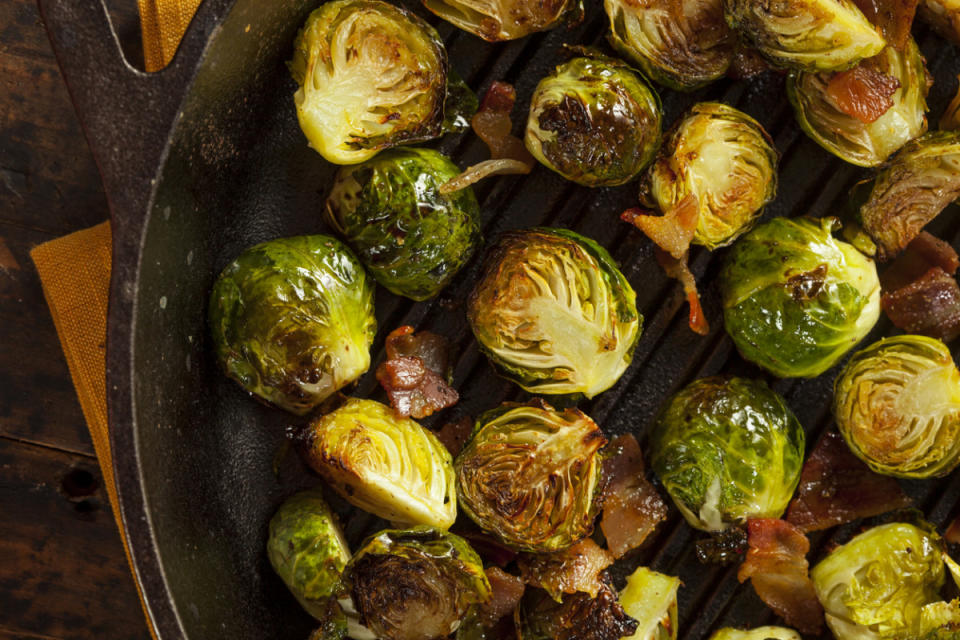
iStock
The perfect “green veggie” side dish, Brussels sprouts contain both fiber and antioxidants to lower cholesterol, says Ayoob.
Grapes
Antioxidants found in the skin of red grapes may help lower cholesterol and decrease inflammation, says Poston.
Added plant stanols
“These are like the plant version of cholesterol. Since they are structurally similar to cholesterol when eaten, they compete with cholesterol for absorption, which can reduce the amount of cholesterol that ends up in the blood,” Izquierdo says.
Blueberries
Blueberries are high in antioxidants and pterostilbene, a compound that may help lower cholesterol and prevent inflammation, says Poston.
Whey protein
Izquierdo says, “Found in dairy products, whey protein supplements have been shown to provide many of the same health benefits of dairy, including lowering LDL and total cholesterol.”
Quinoa
Quinoa is a good source of fiber, which is linked to lowering cholesterol, says Izquierda.
Cashews
Cashews can help lower LDL cholesterol despite their high levels of saturated fat, says Poston.
Green tea
According to Ayoob, “It's loaded with a subgroup of antioxidants called ‘catechins’, which are felt to be at least partly responsible for the cholesterol-lowering effect of green tea."
Pistachios
The phytosterols in pistachios may help lower cholesterol by blocking the absorption of dietary cholesterol, says Izquierda.
Broccoli
In the digestive tract, the soluble fiber in broccoli can bind to bile acids (made up of cholesterol) and remove them in waste before the cholesterol is absorbed, Izquierdo says.
Oranges
Oranges are an excellent source of plant sterols that may help lower cholesterol by blocking the absorption of dietary cholesterol, Poston says.
Peanuts
According to Izquierdo, peanuts are good sources of phytosterols that block the absorption of cholesterol.
Sunflower oil
Some sunflower oil is high in monounsaturated fat, which, when substituted for saturated fat, can help lower cholesterol and triglyceride levels, says Izquierdo.
Next up, here are the warning signs of clogged arteries.
Sources
Elena Paravantes registered dietitian nutritionist and author of the book The Mediterranean Diet Cookbook for Beginners
Leann Poston, M.D., M.B.A., M.Ed. a physician and contributor to Invigor Medical.
Keith Ayoob, EdD, RD, FAND, Associate Clinical Professor Emeritus, Department of Pediatrics at Albert Einstein College of Medicine in New York City.
Amanda Izquierdo, MPH, RD, LDN, a registered dietician from the University of Michigan.
European Journal of Clinical Nutrition: “A diet rich in oat bran improves blood lipids and hemostatic factors, and reduces apparent energy digestibility in young healthy volunteers.”
BMJ Open Diabetes Research and Care: “Walnut ingestion in adults at risk for diabetes: effects on body composition, diet quality, and cardiac risk measures.”
Journal of the American Dietetic Association: “Chickpeas May Fatty Acid and Fiber Intake in an Ad Libitum Diet, Leading to Small Improvements in Serum Lipid Profile and Glycemic Control.”
Science Daily: “One avocado a day helps lower 'bad' cholesterol for heart-healthy benefits.”
National Library of Medicine: “Red grapefruit positively influences serum triglyceride level in patients suffering from coronary atherosclerosis: studies in vitro and in humans.”
Scientific Reports: “Effects of Berries Consumption on Cardiovascular Risk Factors: A Meta-analysis with Trial Sequential Analysis of Randomized Controlled Trials.”
European Journal of Clinical Nutrition: “Effects of cocoa products/dark chocolate on serum lipids: a meta-analysis.”
